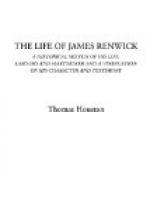If James Renwick was not “sanctified from the womb,” there was clear evidence afforded, that, in early childhood, he was the subject of gracious motions of the Spirit. At two years of age, he was observed to be aiming at secret prayer; and as his childhood advanced, he evinced love to the ways of God, by reading and pondering the Scriptures, delight in secret prayer, and by reverential regard to the authority of his parents. Like Luther, and other eminent servants of God, Renwick was trained for his life-work in the school of temptation; he experienced painful mental conflicts, and the assaults of the tempter, at a very early period. It is recorded that, at six years of age, he was conscious of distressing doubts, in relation to the Divine existence and perfections. These exercised and agitated his mind for a period of two years. In answer to prayer, and by meditation on the power and goodness of God, as seen in creation, he overcame the temptation, and attained to internal composure and tranquillity. At a time of life considerably subsequent, when he had reached mature youth, and had acquired extensive acquaintance with Scriptural truth, a like temptation again assailed him. He himself relates that he fell into deeper perplexity and distress about these fundamental truths. Like the excellent Robert Bruce of the First Reformation, he was strongly tempted to atheism. So powerful at one time was the assault, that, being in the fields and looking to the distant mountains, he exclaimed, “Were all these devouring furnaces of burning brimstone, he would be content to go through them, if he could thereby be assured of the existence of God.” There was at length made for him a way of escape from this severe temptation, and not only did he attain to a full and joyful persuasion of God’s existence, but to the assurance of his personal interest in God as his covenant portion.
James Renwick was endowed with a vigorous reflective mind, and from his childhood he was devoted to reading and study. Amidst considerable difficulties, he commenced and prosecuted with ardour studies for the ministry. There is ample evidence from his writings that his attainments in learning were by no means superficial. Through the kindness of friends raised up in providence, he was enabled to pursue classical studies in Edinburgh, and while attending the University there, he maintained himself till he had finished the undergraduate course, partly by teaching and aiding others in their studies. When his scholarship entitled him to a University degree, he refused to receive this honour, because it was required at the time that students, on graduating, should swear the oath of allegiance, which expressly owned the royal supremacy. In company with two fellow-students, he sometime after received his degree privately.




